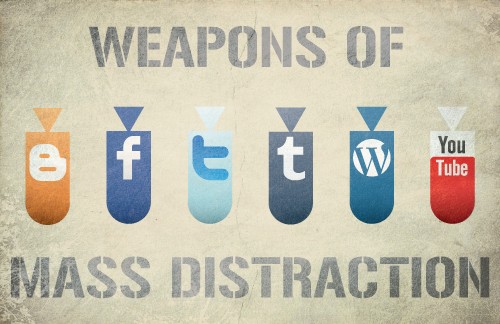Is the internet ruining our brains?
We shouldn’t be talking about the rise of the social media and new media any more. It’s here, in everyone’s lives on a daily basis. And it’s doing things to us. It’s changing the way we communicate, learn, socialise – to name a few. But what is it really doing to our cognitive (and perhaps social) skills?
The question arose when, as a newly started MA New Media student at Universiteit van Amsterdam, a group of students were discussing the ‘ultimate length of a blog post’. Clearly when being in the area, one should take note of that and perhaps be aware of the tricks of the trade. Opinions varied from a few hundred words to 1000 regarding blog posts. So, there doesn’t seem to be a clear-cut formula for blog posting success. How about other ‘new media’ tools? There has actually been discussion over the ideal length of YouTube videos, the more pessimistic claim it’s as little as 10 seconds only, according to the oracle that is Wikipedia, a healthy adult should be able to be focused for about 20 minutes.
And it’s not only our attention span that’s shrinking at the same rate with our ozone layer. All of this because of the everyday technological advantages that do the thinking and remembering for us. Clive Thompson of the Wired magazine writes that people, especially the young, rely more and more on our handset and Google to do the thinking for us. How many phone numbers can you remember? He argues that the line between where the memory leaves off and Google picks up is getting blurrier by the second. “Often when I’m talking on the phone, I hit Wikipedia and search engines to explore the subject at hand, harnessing the results to buttress my arguments.”
But all of this could be not so bad after all. The realm of information the internet, Google and endless link-to-link hopping provides us, is beyond comprehension. The internet also functions as an extension of our brains and also knowledge.
Nicholas Carr, in his article ‘Is Google Making Us Stupid?’ dissects the very issue comprehensively. He talks about “… an uncomfortable sense that someone, or something, has been tinkering with my brain, remapping the neural circuitry, reprogramming the memory.” There is even scientific proof to the fact that our brains have adapted to the ways of the internet. Alan Turing (a British mathematician, in his paper published in 1936) proved that the digital computer, which was only theoretical at the time, could be programmed to perform the function of any other information-processing device. According to Carr, that’s what we’re seeing today. “The internet, immeasurably powerful computing system, is subsuming most of our other intellectual technologies. It’s becoming our map and our clock, our printing press and our typewriters, our calculator and our telephone, our radio and our TV.”

(Disclaimer: this image was circling around tumblr, origin unknown. However, illustrates the point well.)
As a future New Media professional, I am bound by this paradox to the subject that is so controversial. Being academic about things that could, in theory, reduce the academic value of our work? What is the footprint new media really leaves on our people and the society? It definitely hasn’t been around long enough to draw any absolute conclusions, but there definitely isn’t an immediate need to feel morbid. Maybe (our brains being) different isn’t that bad after all? Different from what it was like before, but not necessarily worse. In some respects – yes. The opportunities and the vastness of the information around us should compensate at least to some degree.
Yes, we should be wary of the consequences that could arise from neglecting what has educated the human race for centuries this far, but even the sceptics should neglect the opportunities the internet and new media bring on our table – along with the worries.
All of the above, and especially the controversy around the issue shows that there is a great deal to be learned and studied in the field, which no doubt makes it one of the hottest topics right now. It’ll be interesting watching the first generation of Internet-raised children grow up to see what the real implications of the internet and new media are on our cognitive, emotional and psychological capabilities.